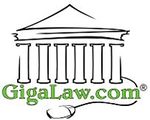Gigalaw.com: Difference between revisions
No edit summary |
No edit summary |
||
| Line 53: | Line 53: | ||
# CAN-SPAM Act and other e-mail legal issues | # CAN-SPAM Act and other e-mail legal issues | ||
# Website legal audits | # Website legal audits | ||
==References== | ==References== | ||
{{reflist}} | {{reflist}} | ||
__NOTOC__ | |||
[[Category:Companies]] | [[Category:Companies]] | ||
Revision as of 02:11, 20 April 2011
 | |
| Type: | Private |
| Industry: | Legal, Internet & Technology |
| Founded: | 2000 |
| Founder(s): | Doug Isenberg |
| Headquarters: | 5555 Glenridge Connector, Suite 200 Atlanta, Georgia 30342 |
| Country: | USA |
| Website: | Gigalaw.com |
| Twitter: | |
| Key People | |
| Doug Isenberg, Lawyer & Publisher | |
Gigalaw.com is a website primarily dedicated in providing information for business owners, professionals and lawyers about the internet and intellectual property laws.
Term Gigalaw
The term Gigalaw stands for intellectual property, internet and technology law; a term coined by Atty. Doug Isenberg by combining the pix "giga" which means one billion and the word law. Although Gigalaw does not exist in the lexicon, the term became popular since Isenberg established the website and the GigaLawFirm in 2000.[1] Isenberg also wrote the book, The GigaLaw Guide to Internet Law.[2]
Recognition
GigaLaw.com received different accolades from various entities which include:[3]
- 5-stars rating — The Essential Guide to the Best (and Worst) Legal Sites on the Web (American Lawyer Media)
- One of the “best data resources on the Web” — PC World
- Website of the Week— Legal Times
- Exceptional —The Internet Lawyer
GigaLaw Firm & Practice Areas
The GigaLawFirm, provides legal services for individual and entities with problems regarding internet, technology and intellectual property.[4]
The firm provides services in the following practice areas:[5]
- Domain name disputes and advice
- Copyright protection and infringement
- Trademark clearance, prosecution, licensing and advice
- Content licensing
- Software licensing and other agreements
- Technology agreements
- Privacy on the Internet
- CAN-SPAM Act and other e-mail legal issues
- Website legal audits

